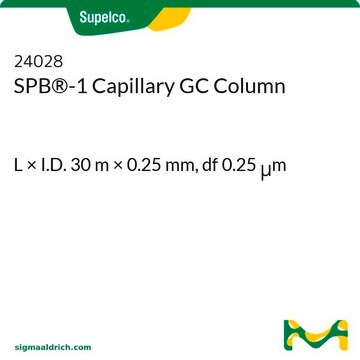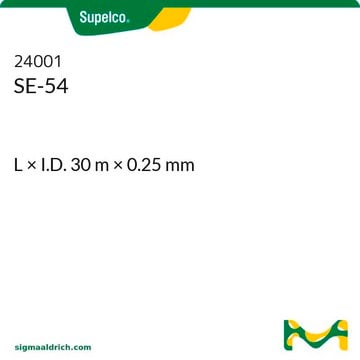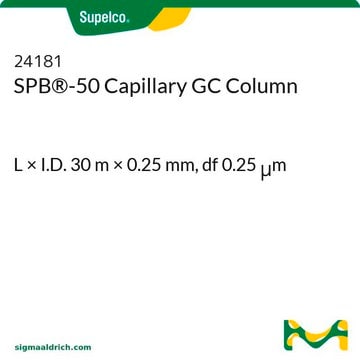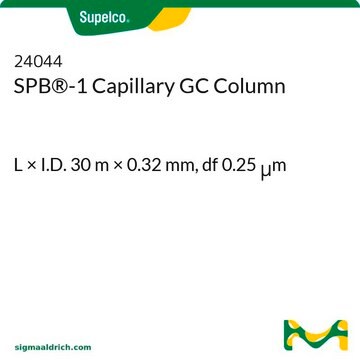24037
Columna para GC capilar SP®-5
L × I.D. 60 m × 0.25 mm, df 1.00 μm
Iniciar sesiónpara Ver la Fijación de precios por contrato y de la organización
About This Item
UNSPSC Code:
41115710
eCl@ss:
32119290
Productos recomendados
material
fused silica
Quality Level
agency
meets requirements for USP G27 and G36
parameter
-60-320 °C temperature (isothermal or programmed)
Beta value
63
df
1.00 μm
technique(s)
gas chromatography (GC): suitable
L × I.D.
60 m × 0.25 mm
matrix active group
Bonded; poly(5% diphenyl/95% dimethyl siloxane) phase
column type
capillary non-polar
¿Está buscando productos similares? Visita Guía de comparación de productos
General description
Aplicación: Esta columna no polar de uso general proporciona principalmente un orden de elución por punto de ebullición con un ligero aumento en la selectividad, en especial para los compuestos aromáticos.
Código USP: Esta columna cumple los requisitos G27 y G36 de la USP .
Fase:
Código USP: Esta columna cumple los requisitos G27 y G36 de la USP .
Fase:
- Ligada
- Poli(difenil al 5 %/dimetil siloxano al 95 %)
- ≤0,32 mm D.I., <2 μm: de -60 °C a 320 °C (isotérmica o programada)
- ≤0,32 mm D.I., ≥2 μm: de -60 °C a 300 °C (isotérmica o programada)
- ≥0,53 mm D.I., <2 μm: de -60 °C a 300 °C (isotérmica ) o 320 °C (programada)
- ≥0,53 mm D.I., ≥2 μm: de -60 °C a 260 °C (isotérmica ) o 280 °C (programada)
Application
SPB®-5 Capillary GC Column was used for speciation of the nitrogen compounds (quantitatively), which are polar and somewhat basic in nature, with chemiluminescence detection. It may also be used as stationary phase for determination of nivalenol and deoxynivalenol in cereals by electron-capture gas chromatography. Furthermore, it may also find application in being used as stationary phase in capillary column gas chromatography for determination of sterols.
Other Notes
We offer a variety of chromatography accessories including analytical syringes
Legal Information
SPB is a registered trademark of Merck KGaA, Darmstadt, Germany
Storage Class
11 - Combustible Solids
wgk_germany
WGK 3
flash_point_f
Not applicable
flash_point_c
Not applicable
Elija entre una de las versiones más recientes:
¿Ya tiene este producto?
Encuentre la documentación para los productos que ha comprado recientemente en la Biblioteca de documentos.
P M Scott et al.
Journal - Association of Official Analytical Chemists, 69(5), 889-893 (1986-09-01)
Nivalenol (NIV) is an important Fusarium mycotoxin shown to occur naturally in grains from several countries. Extraction and cleanup procedures previously described for trichothecene analysis have been modified to give good recoveries of NIV from cereal products. The extraction solvent
Determination of sterols by capillary column gas chromatography. Differentiation among different types of olive oil: virgin, refined, and solvent-extracted.
Jimenez O and Gonzalez ADV.
Journal of the American Oil Chemists' Society, 73 (12), 1685-1689 (1996)
J Corwin et al.
Cancer, 43(3), 1007-1013 (1979-03-01)
Solitary plasmacytoma of bone (SPB) and extramedullary plasmacytoma (EMPC) are unusual solitary tumors of plasma cell origin. The clinical differences between these tumors and multiple myeloma are the subject of continued study. This review examines the radiotherapy experience at M.
Determination of nivalenol and deoxynivalenol in cereals by electron-capture gas chromatography.
Scott PM
Journal - Association of Official Analytical Chemists, 69 (5), 889-893 (1985)
J M Jurado et al.
Talanta, 106, 14-19 (2013-04-20)
4-Methylsterols and 4,4-dimethylsterols of 47 samples of subcutaneous fat from Iberian pigs reared on two different fattening systems, "Extensive" and "Intensive", have been analyzed by GC-MS and GC-FID. The lipids were extracted by melting the subcutaneous fat in a microwave
Nuestro equipo de científicos tiene experiencia en todas las áreas de investigación: Ciencias de la vida, Ciencia de los materiales, Síntesis química, Cromatografía, Analítica y muchas otras.
Póngase en contacto con el Servicio técnico



